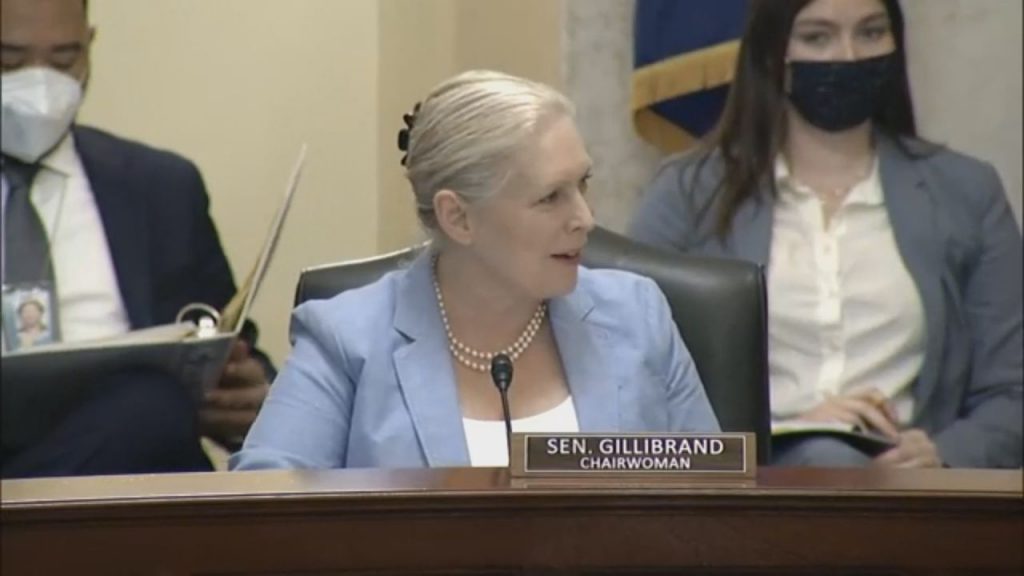
In an opening statement, Gillibrand said that dairy farmers have been losing money.
“The pandemic and the economic downturn are not the only causes of this problem, but they did exacerbate it,” Gillibrand said. “This system cannot adapt to market conditions and thus is not fairly compensating our dairy farmers. The 2018 formula change is a symptom of the larger problems with our federal orders. The current FMMO [Federal Milk Marketing Order] system is confusing, convoluted, and too difficult to fully understand. Different orders have different rules, and some parts of the country are not even under orders.
“The system is inadequate and out of date — we are using an almost 100-year-old system, which had its last major reform more than 20 years ago, for pricing for an industry where no dairy farmer is running their farm the way they would’ve 100 years ago. They should not be beholden to a price system that operates as if they are. We must put the power back in farmers’ hands, help them recoup their losses, and build a system that ensures they get better prices moving forward so they aren’t put in this position again.”
Sen. Cindy Hyde Smith, R-Miss., subcommittee ranking member, and Sen. John Boozman, R-Ark., committee ranking member, both noted that the number of dairy farms has steadily declined in many southern states and that they are concerned about it.
Boozman said that “dairy policy may be a part of that conversation” but that he hears from all farmers “concerns about higher taxes, higher input costs and increasing regulation.”
Boozman took the opportunity to criticize the Democrats’ reconciliation bill and process, an issue he has raised on other occasions.
Jim Davenport, who with his wife, Karen, has a 64-cow dairy in Ancramdale, N.Y., testified that he believes the current pricing system is helpful to processors because thanks to the maturing cheese and butter/powder futures markets they can hedge to protect against price swings. But he added, “To small farmers like us, and especially those who have no chance to capture more of the consumer with value-added retail sales, I feel completely eliminating the Federal Order system would be suicide. There would be chaos in the marketplace.”
Christina Zuiderveen, whose family businesses milk 15,000 cows in Iowa and South Dakota, said the current system “is necessary and provides a safeguard against the market power of large milk buyers. But the system should be modernized to stimulate financial transparency and promote competition and innovation as opposed to consolidation among both processors and producers.”
Mike Ferguson, a dairy farmer from Tate County, Miss., offered a number of technical proposals to improve the pricing system.
Catherine H. de Ronde, vice president, economics and legislative affairs at Agri-Mark Dairy Cooperative, an Andover, Mass.-based cooperative with 700 member owners, said that “2020 was an outlier year for dairy markets” and that the “hearing is an important step in the early stages of the dialogue on milk pricing issues.” She added, “Milk pricing must be addressed comprehensively. The formal rulemaking process will ensure that all perspectives are taken into consideration and that individual milk pricing concerns are not looked at in a vacuum.”
Robert Wills, owner of Cedar Grove Cheese and Clock Shadow Creamery, an urban cheese factory in Plain, Wis., noted that 47 years ago he was on the staff of the Joint Economic Committee and that Rep. Wright Patman, D-Texas, the committee chairman, praised him for the brevity of a memo in preparation for a hearing on the Glass-Steagall Banking Act of 1933.
“Unfortunately, the subject of today’s hearing is much tougher to condense,” Wills commented.
Noting that federal milk marketing orders were designed in the 1930s to encourage farmers to produce milk in underserved regions and to prioritize milk to bottling rather than other dairy products and that technology is causing many changes in the industry, Wills said, “The dairy industry needs to quit squabbling over esoterica of milk marketing and keep its eye on the prize: our customers. The government should step out and let dairy compete. That is the best hope for our farmers.”
Christopher Wolf, a professor of agricultural economics at Cornell University in Ithaca, N.Y., said, “Given the age of the FMMO system, length of time since the last major reform, and changes in the market from both the production and consumption side, it is likely time to re-examine many aspects of FMMOs, including many issues that motivate this hearing. If we were to start over with U.S. dairy policy, it seems unlikely we would arrive at the current system. However, there are legitimate reasons for making each of the previous policy revisions and choices.” Any reform, he said, “should balance the interests of all involved parties including equity as well as economic efficiency.”























